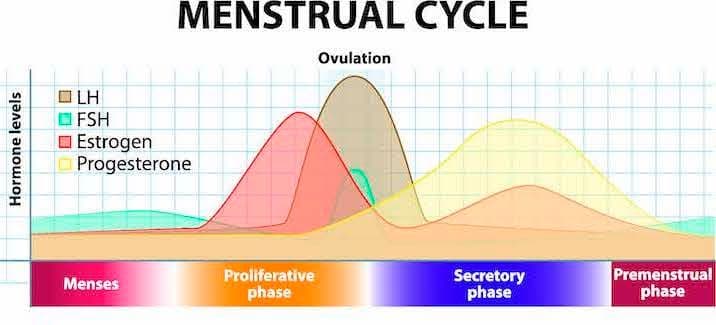Your Fifth Vital Sign: The Menstrual Cycle and Your Periods
Reproductive Health
Obie Editorial Team

Using vital signs to measure health
“Measure what is measurable, and make measurable what is not so” ― Galileo Galilei
What is a regular period or menstrual cycle and what is considered irregular?
A menstrual period is your monthly bleeding lasting usually between 3-5 days. A menstrual cycle is the time between the first day of your period until the first day of the next period. Your menstrual cycles normally last between 21 and 35 days. If over the last 6-9 months your cycles differ by more than 3-4 days, ie if they are 24 days and then 29 days long, then they are considered irregular menstrual cycles.
Learn more about irregular cycles.
A regular menstrual period normally means normal ovulation
Your regular periods depend on regular ovulation. Your period usually comes about 12-16 days after you ovulate. So if your cycles are irregular, the ovulation is iusually irregular too. And if you have no menstrual periods, there is a chance that you don't ovulate (anovulation) on your own.
Shorter or longer or irregular cycles may indicate problems with your ovulation.
If you don't have a regular period and if you don't menstruate regularly every month, then you either don't ovulate at all (anovulation) or you have problems with ovulation. Without ovulation, you cannot get pregnant unless your doctor finds the cause and treats it. First, your doctor needs to find out if you ovulate. Then, the causes of your anovulation should be evaluated. You can then get treated depending on what the causes are, and ovulation can be induced with medication. Up to 50% of women on medication who ovulate will get pregnant within three months.
Your periods and cycles are a window into your health
Infertility is not only a distinct disease process, but also a window to your future health. Your menstrual cycles and periods are a clear level of your chance of being infertile.
Your menstrual cycles and your fertility as well as your menstrual periods and bleeding can help tell you not only about your present health but they are also a window into your future health. Measuring your cycle lengths and regularity as well as checking if your periods are too light or too heavy should be an essential part of every woman's vital signs and could help you with improving your health.
- Menstrual cycles normally last between 24-32 days. Cycles that are shorter or longer or cycles that are irregular are not normal and could predict a present or future health issue.
- Menstrual period bleedings normally last between 2-6 days. Periods that are shorter or longer than 6 days or bleeding that is heavier are abnormal and should be checked because they could be a sign of an underlying health issue.
Vital signs are measurements to check a person's health. The following are the top 4 vital signs being checked:
- Temperature (measured with a thermometer)
- Heart Rate (measured with a stethoscope)
- Blood pressure (measured with a blood pressure monitor)
- Respiratory rate (measured with respirometer)
Menstrual period and cycle calculators
- What is your menstrual period?
- Is my menstrual period late calculator
- Calculate my next menstrual period
- Menstrual cycle calculator: Are my cycles normal?
- Calculate your fertile window
- Is my luteal phase normal? Calculator
The fifth vital sign: The menstrual cycle and periods
The "fifth vital sign" may refer to a few different parameters such as the menstrual cycle, pain, oxygen saturation, and blood glucose levels. The fifth vital sign, plus your fertility, is a measure of future health. The menstrual period and cycle should be added to be measured as a fifth vital sign.
How to measure your fifth vital sign:
- First day of your period, the first day of bleeding
- Last day of your period
- Number of cycle days
- Ovulation day
- Fertile window
- Implantation day
- Next period
- Missed period
Infertility might also serve as a marker for elevated cancer risk, there is a relationship between body weight – a ‘read-out’ of metabolic function – and fertility or fecundity, and men whose primary complaint is infertility have a higher number of comorbid conditions than those who seek medical attention for other issues.
Studies have shown that irregular menstrual cycles are not just an impediment to fertility, but irregular and long menstrual cycles in adolescence and adulthood are associated with a greater risk of premature mortality (age <70 years). Irregular and long menstrual cycles have been associated with a greater risk of:
- coronary heart disease
- cancer
- mental health problems, and
- multiple other common chronic conditions
For example, one cause of irregular cycles, PCOS, a common endocrinologic disorder found in many women, has also been associated with a higher risk of type 2 diabetes, dyslipidemia, non-alcoholic fatty liver disease, coagulation disorders, and possibly cardiovascular disease. These data collectively indicate that menstrual cycle dysfunction might accelerate the risk of premature mortality. There also is evidence for an association between male and female infertility and later health.
Therefore, measuring the fifth vital sign, your menstrual cycles, and your fertility, can tell you what may happen with your future health. Infertility is an early marker of chronic disease, and screening practices should be adjusted to include measuring the fifth vital sign, similar to other signs like for patients with a family history of malignancy or other conditions.
Read More










